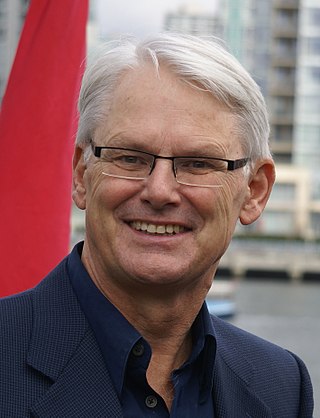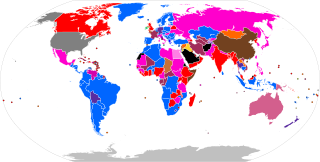Plurality voting refers to electoral systems in which a candidate who polls more than any other is elected. In systems based on single-member districts, it elects just one member per district and may also be referred to as first-past-the-post (FPTP), single-member plurality (SMP/SMDP), single-choice voting, simple plurality or relative majority. A system that elects multiple winners elected at once with the plurality rule and where each voter casts multiple X votes in a multi-seat district is referred to as plurality block voting. A semi-proportional system that elects multiple winners elected at once with the plurality rule and where each voter casts just one vote in a multi-seat district is known as single non-transferable voting.

Proportional representation (PR) refers to any type of electoral system under which subgroups of an electorate are reflected proportionately in the elected body. The concept applies mainly to political divisions among voters. The essence of such systems is that all votes cast – or almost all votes cast – contribute to the result and are effectively used to help elect someone – not just a bare plurality or (exclusively) the majority – and that the system produces mixed, balanced representation reflecting how votes are cast.

The two-round system (TRS), also known as runoff voting, second ballot, or ballotage, is a voting method used to elect a single candidate, where voters cast a single vote for their preferred candidate. It generally ensures a majoritarian result, not a simple-plurality result as under first past the post. Under the two-round election system, the election process usually proceeds to a second round only if in the first round no candidate received a simple majority of votes cast, or some other lower prescribed percentage. Under the two-round system, usually only the two candidates who received the most votes in the first round, or only those candidates who received above a prescribed proportion of the votes, are candidates in the second round. Other candidates are excluded from the second round.
Strategic voting, also called tactical voting, sophisticated voting or insincere voting, occurs in voting systems when a voter votes for a candidate or party other than their sincere preference to prevent an undesirable outcome. For example, in a simple plurality election, a voter might gain a better outcome by voting for a less preferred but more generally popular candidate.

First-past-the-post voting is an electoral system wherein voters cast a vote for a single candidate, and the candidate with the most votes wins the election. Analogous systems for multi-winner contests are known as plurality block voting or "block voting" systems; both FPTP and block voting are "plurality" systems in that the winner needs only a plurality of the votes and not an absolute majority. The term first-past-the-post is a metaphor from horse racing of the plurality-voted candidate winning such a race; the electoral system is formally called single-member plurality voting (SMP) when used in single-member districts, and informally called choose-one voting in contrast to ranked voting or score voting.

The Electoral Reform Society (ERS) is an independent campaigning organisation based in the United Kingdom which promotes electoral reform. It seeks to replace first-past-the-post voting with proportional representation, advocating the single transferable vote, and replacing the House of Lords. It is the world's oldest operating organisation concerned with political and electoral reform.
Canada holds elections for legislatures or governments in several jurisdictions: for the federal (national) government, provincial and territorial governments, and municipal governments. Elections are also held for self-governing First Nations and for many other public and private organizations including corporations and trade unions. Municipal elections can also be held for both upper-tier and lower-tier governments.

The 2005 British Columbia general election was held on May 17, 2005, to elect members of the Legislative Assembly (MLAs) of the Province of British Columbia (BC), Canada. The British Columbia Liberal Party formed the government of the province prior to this general election under the leadership of Premier Gordon Campbell. The main opposition was the British Columbia New Democratic Party, whose electoral representation was reduced to two MLAs in the previous provincial election in 2001.
BC-STV is the proposed voting system recommended by the Citizens' Assembly on Electoral Reform in October 2004 for use in British Columbia, and belongs to the single transferable vote family of voting systems. BC-STV was supported by a majority of the voters in a referendum held in 2005 but the government had legislated that it would not be bound by any vote lower than 60 percent in favour. Because of the strong majority support for BC-STV, the government elected to stage a second referendum in 2009, but with increased public funding for information campaigns to better inform the electorate about the differences between the existing and proposed systems. The leadership of both the "yes" side and the "no" side were assigned by the government. The proposal was rejected with 60.9 percent voting against, vs. 39.1 percent in favour, in the 2009 vote.

FairVote, formerly the Center for Voting and Democracy, is a 501(c)(3) organization that advocates electoral reform in the United States.
A nonpartisan blanket primary is a primary election in which all candidates for the same elected office run against each other at once, regardless of the political party. Partisan elections are, on the other hand, segregated by political party. Nonpartisan blanket primaries are slightly different from most other elections systems with two rounds/a runoff, also known as "jungle primaries" , in a few ways. The first round of a nonpartisan blanket primary is officially the "primary." Round two is the "general election." Round two must be held, even if one candidate receives a majority in the first round.
A single-member district is an electoral district represented by a single officeholder. It contrasts with a multi-member district, which is represented by multiple officeholders. Single-member districts are also sometimes called single-winner voting, winner-takes-all, single-member constituencies or single-member electorates.
The Independent Party of Oregon (IPO) is a centrist political party in the U.S. state of Oregon with more than 140,000 registrants since its inception in January 2007. The IPO is Oregon's third-largest political party and the first political party other than the Democratic Party and Republican Party to be recognized by the state of Oregon as a major political party.
Electoral reform in the United States refers to efforts to change American elections and the electoral system used in the United States.
Plurality block voting, also known as plurality-at-large voting, bloc vote or block voting (BV) is a non-proportional voting system for electing representatives in multi-winner elections. Each voter may cast as many votes as the number of seats to be filled. The usual result when the candidates divide into parties is that the most popular party in the district sees its full slate of candidates elected in a seemingly landslide victory.

An electoral system or voting system is a set of rules that determine how elections and referendums are conducted and how their results are determined. Electoral systems are used in politics to elect governments, while non-political elections may take place in business, non-profit organisations and informal organisations. These rules govern all aspects of the voting process: when elections occur, who is allowed to vote, who can stand as a candidate, how ballots are marked and cast, how the ballots are counted, how votes translate into the election outcome, limits on campaign spending, and other factors that can affect the result. Political electoral systems are defined by constitutions and electoral laws, are typically conducted by election commissions, and can use multiple types of elections for different offices.
A unified primary is an electoral system for narrowing the field of candidates for a single-winner election, similar to a nonpartisan blanket primary, but using approval voting for the first round, advancing the top-two candidates, allowing voters to confirm the majority-supported candidate in the general election.
Dual-member proportional representation (DMP), also known as dual-member mixed proportional, is an electoral system designed to produce proportional election results across a region by electing two representatives in each of the region’s districts. The first seat in every district is awarded to the candidate who receives the most votes, similar to first-past-the-post voting (FPTP). The second seat is awarded to one of the remaining district candidates so that proportionality is achieved across the region, using a calculation that aims to award parties their seats in the districts where they had their strongest performances.
The 2022 Wellington City mayoral election, part of the Wellington local elections in October 2022, determined who would serve as Mayor of the City of Wellington for the next three-year term. It was won by Tory Whanau, a former Green Party parliamentary chief of staff.
The League of Women Voters of California is a nonpartisan organization that is a part of the national League of Women Voters founded by Carrie Chapman Catt in the 1920s. The league was formed from the National American Women's Suffrage Association. Their stated goals are to encourage "informed and active participation in government," "increase understanding of major public policy issues," and influence "public policy through education and advocacy." The league has over 65 county groups within the state.







